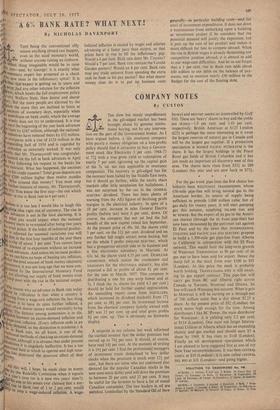'A 6% BANK RATE? WHAT NEXT!
By NICHOLAS DAVENPORT
THIS being the conventional silly season anything absurd can happen, even in the staid monetary world, without anyone raising an eyebrow. la „silliest thing imaginable would be to raise rate—and, by George! it is exactly what 117 monetary expert has proposed as a check he new twist in the inflationary spiral! It is that thirtxpert is getting on in years and 1.,1),evel.,had any other solution for the inflation which besets the full employment policy every Welfare State, than dearer and dearer 'icy. But the more people are alarmed by the "on the more they are inclined to listen to ancients of monetary days, especially when Y Pontificate on bank credit, which the average Ps -11 wisely does not try to understand. It is true I since the beginning of the year bank advances risen by £167 million, although the national- industries have reduced theirs by £52 million. S compares with a rise of £124 million in the esPonding half of 1956 and is regarded by orthodox as extremely wicked. It was only e,r'IIY that Mr. Thorneycroft was congratulat- oirnself on the fall in bank advances in April May following his request to the banks for re restraint. What has happened, the ancients , to his credit squeeze? Total gross deposits are 7it ut £200 million higher than twelve months II . Who created that money? You must stop fL Y further creation of money, Mr. Thorneycroft, Nii 'cry. You know the first step—the one which nts----a rise in Bank rate to 6 per cent.!
* * *
liekre it is too late I would like to laugh this illI1it41°11; idea right out of currency. The rise in ' advances is not in the least alarming. It is
• what you would expect when the national • k, starts to re-expand after being two years ;I strait jacket. If the index of industrial produc-
ts adjusted for seasonal variations you will o that in the first four months of the year there S a rise of about 3 per cent. You cannot have t , amount of re-expansion without an increase bank advances. And unless we increase produc- in l'Nve can have no hope of beating any inflation. tor the total amount of bank money (deposits) ee 1 .'tiStence, it was not long ago that we were con- t orrulated by the International Monetary Fund 13 knot allowing our supply of bank money even , col eeP pace with the rise in the national output.
id 'ol'Ithe * * *
Iv reason why an advance in Bank rate today 311 tut, . be ridiculous is that when a country is 14,1 (Ting 1, from a wage-cost inflation the last thing '4 re "ants is to have its costs further inflated, a , 1:011h1 I, which dearer money would inevitably bring f ,, l'u 1 Zbh between t wf aesehni oann among excess-demand deconomists fl inflation i ot on and i x,, gge-cost inflation. (Every inflation ends n an I / 4sehs demand, so the distinction is academic.) A raed.io, Bank rate, we all know, is one of the nfl„,1t,lcmal methods of checking an excess-demand ""on, although it is obvious that under present stnrditions it is singularly ineffective. It has a too ( ,hoicted field in which to operate and high taxa- 011 'n has destroyed the deterrent effect of dear lecineY.
* " *
,1011A1,1 this will, I hope, be made clear to every- f(90 by the Radcliffe Committee when it reports ' .4. Year's time (or is it now two years' time?). Ihi one in his senses ever claimed that a nor- rise in Bank rate of 1 or 2 per cent. would "IP to stop a wage-induced inflation. A wage-
indticed inflation is caused by wages and salaries advancing at a faster pace than output, so that prices have to rise to fill the inflationary gap. Would a 6 per cent. Bank rate deter Mr. Cousins? Would a 7 per cent. Bank rate restrain the Covent Garden porters? Would an 8 per cent. Bank rate stop any trade unionist from spending the extra cash he finds in his pay packet? But what dearer money does do is to put up business costs
generally—in particular building costs,---and, the total of investment expenditures. It does not deter a businessman from embarking upon a building o.r investment project if he considers that the potential demand will justify the expansion, but it puts up the cost of his product and makes it more difficult for him to compete abroad. When the rise in British wages is already threatening our competitive position abroad, it is absurd to add to our wage-cost difficulties. And let us not forget that a 1 per cent, rise in Bank rate adds about £40 million to our debit on the balance of pay- ments, not to mention nearly £50 million to the Budget for the cost of the floating debt.






























 Previous page
Previous page